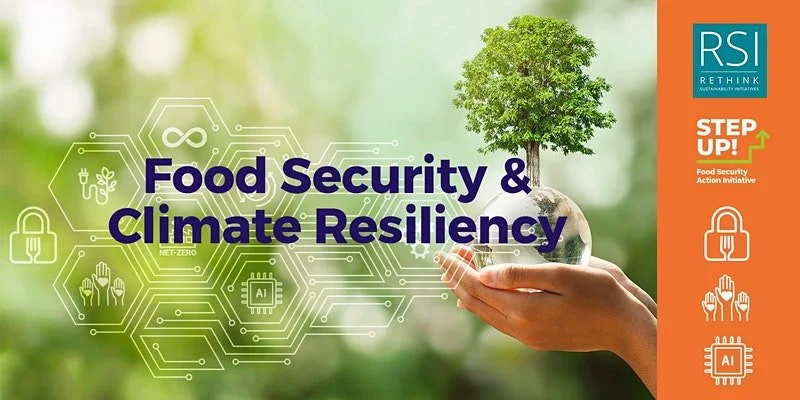Rethinking and Repurposing Food Waste. A Circular Economy of Well being, Business, Communities and Cities.
About this event
Join RSI for a series of weekly, one-hour action learning speaker webinars during the month of May 2022.
Designed for action learning, the speaker series will feature a diversity of topic related leaders and experts recognized for their innovative, inclusive and systems thinking in advancing food security and climate resiliency in Canada to get their views on the future of food in a time of great change.
About the Speakers:
As a senior economist, Dr. Beaudoin brings an ‘economics for transition’ lens to the Foundation aimed at helping to enable a socially thriving and ecologically sustainable Canada. He applies the art of change and participatory social processes to a variety of themes that include: adaptation to uncertain climate futures, embedding local, traditional and indigenous knowledge in policy decision and choice-making, and promoting a transition to a sustainable relationship between society and Nature. From his decade with the United Nations, prior to his return to Canada in 2018, he has been facilitating conversations around the world, highlighting solution pathways towards a well-being centric, beyond GDP economic system. Most recently, he has been co-leading the inception of the Well-being Economies Alliance for Canada and Sovereign Indigenous Nations (WEAll Can) to help in the re-imagination of the purpose of an economy.
Too Good To Go is the leading app for fighting food waste and is championing the movement into the Canadian market.
Sam moved to Toronto as a first-generation immigrant more than 23 years ago. His first job in Canada was in the food service industry where he saw, firsthand, how consumer demand for speed and selection produced a consequential increase in food waste! Since then, his love for food has taken him to more than twenty countries around the world discovering many new cuisines, transforming his relationship with food from “love” to “respect”.
He has held multiple leadership positions in both global and scale up organizations and was recognized by Marketing Magazine’s “30 under 30” in 2014.
His constant focus is balancing performance with purpose and empowering Canadians to join the fight against food waste.
Dr. Tammara Soma MCIP RPP is an Assistant Professor at the School of Resource and Environmental Management (Planning program) at Simon Fraser University and Research Director of the Food Systems Lab. Originally hailing from Indonesia, she conducts research on issues pertaining to food loss and waste (FLW), food system planning, food access, and the circular food economy. Dr. Soma is a Co-editor of the Routledge Handbook of Food Waste, and co-founder of the International Food Loss and Food Waste Studies group, a global network of FLW researchers and practitioners. Dr. Soma was selected as a committee member of the US National Academies of Science and co-authored the consensus study A National Strategy to Reduce Consumer Food Waste. She leads numerous tri-council funded research projects and is routinely featured in international and local media (BBC, CBC, TVO, CTV, Huffington Post, National Observer, Chatelaine and more). In 2021, the Food Systems Lab was recognized as one out of the four women-run projects that are redefining agriculture by the Canadian Organic Grower. She was also named by Chatelaine magazine as one of the 10 inspiring Canadian women saving the environment. She is a registered professional planner and a proud mother of three.
Neil Hetherington joined Daily Bread Food Bank as CEO in January 2018. Neil began his career in project management at Tridel Construction, Canada’s largest condominium developer. In September 2000, he made a career change by joining Habitat for Humanity Toronto, at the time as the youngest CEO of a Habitat affiliate in the world. Neil’s non-profit experience includes 16 years as CEO of Habitat for Humanity in Toronto, and then New York City, and two years as CEO of Dixon Hall, a multi-service agency with 240 staff serving thousands of people in Toronto through its social programs, shelters, seniors programs, youth initiatives and community revitalization efforts. Neil holds degrees or certificates from the University of Western Ontario – Huron College, Seneca College, Harvard Business School and the University of Virginia – Darden Business School. He obtained his MBA from the University of Western Ontario’s Ivey Business School in 2013. He is an active pilot and sailor. He enjoys furniture making and in his spare time plays tennis terribly, snowboards poorly and bikes slowly.
Why now? Why a Systems Approach?
Over 5.6 million Canadians live with food insecurity, hunger and poverty every day of their lives! With the impacts of Covid-19, rising inflation and climate change across the supply chain, the actual number of people living with hunger is likely a lot higher than what’s reported.
The 2022 Food Price Report for Canada forecasts a 5% to 7% increase in food prices in 2022, the highest in its 12-year history. This translates to an annual cost of food of $14,767 for the average Canadian family – an increase of $966 over 2021.
This is a highly concerning figure for Canada’s most vulnerable people. There is more than enough food produced to nourish every Canadian, but over 50% of our produce gets wasted. There are clear systemic challenges that need to be explored. These complex supply dynamics are shifting rapidly.
It is a complex, interconnected problem that needs to be explored, understood and addressed with a futures lens and systems approach.

